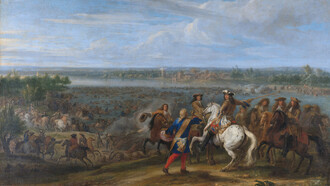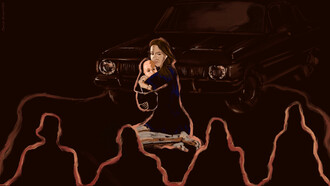Meet Alberto Tagliaferri, Silvia De Angelis, Simona Fanini and Alessandro Locchi: Four exceptional licensed tour guides in Rome, who bring the archaeology and art history of Rome and its province to life. No matter the subject matter they teach, they captivate their audience and give their students something to remember for years to come, and most importantly help their students pass one of the toughest tour guide exams- that of Rome.
Not just anyone can be a tour guide. Tour guides in the eternal city must be officially licensed by the Italian government. They have a tremendous responsibility to make the tourist experience memorable, entertaining, informative, and most importantly bust’n a move with a steady pace, with no stops for long lectures. No one wants to stand or sit through a long, boring humorless art history and archaeological lesson---tourists tune out, get bored, turn to their iPhones, and worse, walk away from the guided tour.
If you are traveling to any city in Italy, I would like to point out that unqualified guiding is not permitted by Italian Law. To become a licensed tour guide in Italy – all candidates are required to pass an examination published by the local tourist authorities to test their knowledge of the city in terms of its history and geography, its art and architecture, its museums, art galleries, Churches, and cultural features. It is also required for candidates to show proof of any foreign languages for which they applied. They must present the results of both oral and written language exams.
Mirabilia Urbis was founded in 2002. The Association aims to spread interest in culture, art history, architecture, and archaeology, while giving interested candidates the tools needed to pass the Rome tour guide exam.
The following questions seem relevant to these engaging particulars.
My compliments when Italian tour guides deliver tours in other languages, for it makes a world of difference. English is the universal language, and many tourists prefer a fluent and confident English-speaking guide. Nevertheless, how is this skill beneficial to the tour operator, and to your students, when the courses are all taught in the Italian language?
Mirabilia Urbis organizes courses, which include on-site visits to archeological sites, churches and museums in Italian every year because, good or bad, the tourist guide exam has always been held in Italian. With these courses we hope to help people learn and practice the terminology in Italian that will be used on the exam. Our on-site visits further assist in this aspect. Of course, prospective tourist guides from other country must know the Italian language to be able to work here and interact with officials, especially in case of any problems.
Tour guides are hired by tourists from all walks of life, individuals who have their own cultural expectations. Although we all would like to think that the tourism industry accepts everyone and embraces diversity, in realty, we still have a long way to go. How do you effectively teach this concept in the light of the real situation?
We hope to give them abundant information and on-site experience to feel confident in what they do. We also add many interesting stories to give them a wide range of things to talk about. We then teach our students the importance of adapting their way of communicating to those in front of them, choosing their words, attitudes, and actions based on diversity of their clients. We mean diversity in the full sense, not just cultural, but also age, interest etc.
To what extent, both in this course, and the Rome exam, are those excluded specialized in only Art History and Archaeology? Do experts, including authors and University professors, need an official license to participate in the tour guide profession? Why?
We do not exclude anyone from our courses, nor do we ask for any pre-requisites to participate. In this way, we do not require any “specialized degree”, only the intense desire to learn and study. Our staff are experts in their various fields, and we try to give the information at a very high level, as if for a university. I would also like to note that a high percentage of our students have passed the official Rome tour guide exam, which we are very satisfied and proud of.
As for the exam, we are waiting to hear from the Italian government which pre-requisites will be needed to participate in the next tour guide exam to help our students.
Until now, only a high school diploma was required to be a guide, while in our opinion at least a bachelor's degree should be required. To date, experts need an official license to carry out the profession of a tour guide.
Do you feel burdened by a strict academic system developed in the 18th and 19th centuries, an agenda which still exercises such tremendous influence over the learning opportunities presented by cultural patrimony, tourism, and pilgrimage in an increasingly interdisciplinary world, indeed, a world which encourages life-long learning?
Our cultural association, being that we all are active licensed tour guides, has the great privilege of actually being able to do on-site tours, where students can learn firsthand about the material, not just from lectures and books. They can see, experience, and learn the material directly in all its aspects. This, in our opinion, makes us quite different from a strict academic system. We also put our ideas in context with the time we are talking about, linking the figurative arts and other disciplines, such as theater, music, cinema, literature, etc. to what they are learning.
Are there individuals in your consortium from outside of Rome? Italy?
In our cultural association there are various people from outside Rome and outside Italy who collaborate with us, in the practical and logistical organization of visits and events, as well as in other areas.
What is the advantage of encouraging an international Academy of interdisciplinary scholars?
Certainly, our association is interested in encouraging an international meeting of interdisciplinary scholars that will finally lead to a greater appreciation of the immense and underestimated cultural heritage of Rome. We hope more of this occurs in the future. This includes not only ancient Rome and Baroque art, which Rome is known for, but restoration, construction and other aspects required to maintain the treasures that are in Rome. In line with this, for specialized courses, we have experts lecture to our students from other fields, such as individuals involved in the restorations occurring in the Vatican, and Roman churches and palaces.
How do you overcome a mindset which limits Rome to a destination fashioned only "by Romans" rather than considering Rome as a nexus and crossroads of international scholarship, study, and insight by and for an international audience, as multicultural tourism is booming?
Multicultural tourism should be redirected on the same wavelength, channeling tourist flows onto alternative routes to the classical mass tourism ones. We provide excellent information and encourage our diverse students to make it a different reality than is currently present- with their knowledge of Rome and then incorporating their cultural background into presenting and experiencing Rome.
Italy now has the first woman prime minister and is making significant cultural changes to prepare for the 2025 Jubilee year. Taking this into consideration, will the Rome tour guide exam finally be open to diverse persons from all walks of life who can offer tours in their mother tongue language -- that is, not Italian or English?
We hope that the new tourist guide exam will be able to turn out new competent, passionate, communicative guides, in line with the directives that we have been providing since our first training courses. We are proud of the diversity of our students and as such, our “guide graduates” can offer tours in their native language, which is not Italian or English, such as Russian, Chinese, Japanese, Hebrew, Arabic and other European languages.
Multicultural tourism is what makes Italy thrive economically, and therefore the equality of multicultural licensed tour guides will be a blessing for a multicultural world, especially for the 2025 Jubilee.
Vatican Jubilees are designed as “a special year of grace," during which the Catholic church offers the faithful the possibility of obtaining a plenary indulgence. The word Catholic is derived from the Greek adjective, katholikos, meaning “universal”, from "kata", and "holikos”, “according to the whole". Therefore, the term implies being all-inclusive, or extending to and embracing all, or a collective whole, distributed without limit or exception.
With collaboration of Andrea B. Stoler, PhD, a current participant in Mirabilia Urbis courses.
Author’s note: as an academic and author, I was also a participant of Mirabilia Urbis courses and today I am an accredited and licensed tour guide in Rome.















